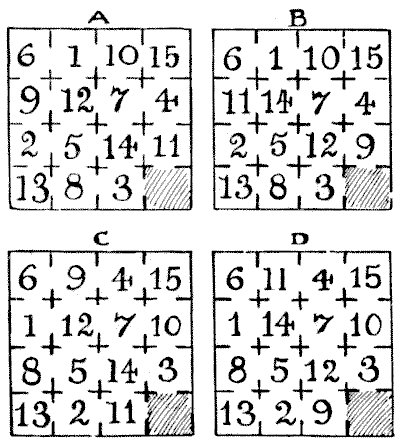(related to Problem: Exercise For Prisoners)
There are eighty different arrangements of the numbers in the form of a perfect knight's path, but only forty of these can be reached without two men ever being in a cell at the same time. Two is the greatest number of men that can be given a complete rest, and though the knight's path can be arranged so as to leave either $7$ and $13, 8$ and $13, 5$ and $7,$ or $5$ and $13$ in their original positions, the following four arrangements, in which $7$ and $13$ are unmoved, are the only ones that can be reached under the moving conditions. It, therefore, resolves itself into finding the fewest possible moves that will lead up to one of these positions. This is certainly no easy matter, and no rigid rules can be laid down for arriving at the correct answer. It is largely a matter for individual judgment, patient experiment, and a sharp eye for revolutions and position.

As a matter of fact, the position C can be reached in as few as sixty-six moves in the following manner: $12, 11, 15, 12, 11, 8, 4, 3, 2, 6, 5, 1, 6, 5, 10, 15,$ $8, 4, 3, 2, 5, 10, 15, 8, 4, 3, 2, 5, 10, 15,$ $8, 4, 12, 11, 3, 2, 5, 10, 15, 6,$ $1, 8, 4, 9, 8, 1, 6, 4, 9, 12, 2, 5, 10,$ $15, 4, 9, 12, 2, 5, 3, 11, 14, 2, 5, 14, 11 = 66$ moves. Though this is the shortest that I know of, and I do not think it can be beaten, I cannot state positively that there is not a shorter way yet to be discovered. The most tempting arrangement is certainly $A;$ but things are not what they seem, and $C$ is really the easiest to reach.
If the bottom left-hand corner cell might be left vacant, the following is a solution in forty-five moves by Mr. R. Elrick: $15, 11, 10, 9, 13, 14, 11, 10,$ $7, 8, 4, 3, 8, 6, 9, 7, 12, 4,$ $6, 9, 5, 13, 7, 5, 13, 1, 2,$ $13, 5, 7, 1, 2, 13, 8, 3, 6,$ $9, 12, 7, 11,$ $14, 1, 11, 14, 1.$ But every man has moved.
This eBook is for the use of anyone anywhere in the United States and most other parts of the world at no cost and with almost no restrictions whatsoever. You may copy it, give it away or re-use it under the terms of the Project Gutenberg License included with this edition or online at http://www.gutenberg.org. If you are not located in the United States, you'll have to check the laws of the country where you are located before using this ebook.